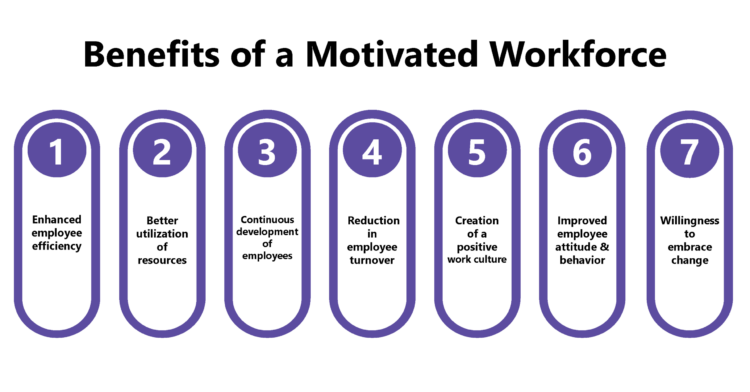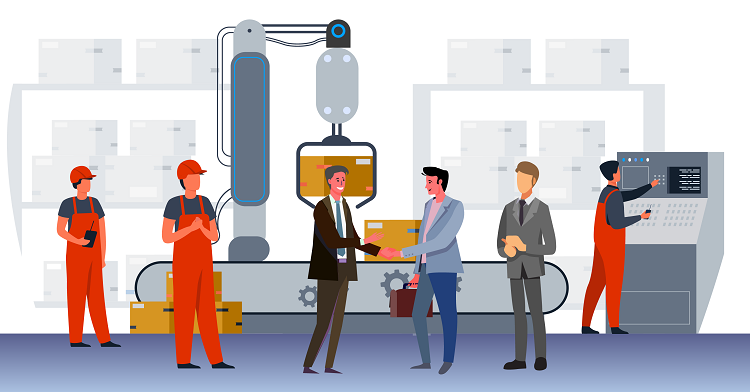1. A highly motivated workforce is a desirable goal and a crucial factor for an organization’s success. It leads to improved performance, increased productivity, and ongoing learning and development.
2. Motivated employees are likelier to stay with the company, contributing to lower turnover rates and fostering a positive work culture.
3. They also drive significant innovation and are more adaptable to change, significantly benefiting the organization in a competitive business environment.
4. A motivated workforce enhances efficiency and supports long-term organizational growth, making it a worthwhile goal to pursue.
Employee motivation is critical to their efficiency and performance at the workplace. Hence, building a highly motivated workforce is vital for most organizations. Thus, organizations first need to understand the concept of employee motivation and its benefits.
‘Employee Motivation‘ can be defined in the simplest terms as the eagerness or commitment of an employee to perform a task.

Hence, organizations must ensure employees find their work enjoyable and are satisfied with the overall work environment.
Both of these factors contribute significantly to keeping employees motivated and engaged, thereby enhancing their performance and efficiency.
A survey conducted by Gallup has shown that organizations that see a rise in 20% in engagement, experience a 41% reduction in absenteeism and a 59% decline in employee turnover rates. Engaged employees are more likely to avoid missing work and develop a deep sense of passion, purpose, presence, and energy towards their job.
A well-motivated workforce can prove to be the greatest asset for the organization.
It tends to be more productive, has a lower turnover rate, and is more committed to organizational growth.
Therefore, motivated employees feel they are an integral part of their organization, which helps create a positive work environment.

The following are the key advantages that organizations can enjoy by having a motivated workforce:
1. Better Performance
2. Higher Productivity
3. Continuous Learning
4. Lower Employee Turnover
5. Positive Work Culture
6. Greater Innovation
7. Easier Change Management


Notably, highly motivated employees have significantly higher performance and efficiency levels.
When motivated, employees naturally strive to do their best in completing tasks.
Therefore, motivation helps transform the knowledge and skills of employees into enhanced performance and greater business impact.

Moreover, motivated employees exhibit a more profound sense of ownership over the organization’s resources and tend to utilize them more efficiently.
Therefore, they work towards minimizing wastage and show a willingness to share resources with their co-workers from the same or even different teams.
Hence, it helps in reducing the overall operational costs, which can prove beneficial, especially for organizations with limited resources.

Additionally, employees tend to push themselves toward achieving their professional objectives when motivated.
It helps facilitate their self-development, as they demonstrate eagerness to acquire new skills and adopt behaviors that can stimulate their growth.
Hence, they work towards constantly improving themselves as they try to attain even greater levels of success for themselves as well as their organization.

Higher motivation leads to improved employee performance and efficiency. It makes them feel more satisfied with their current organization.
This sense of satisfaction minimizes their desire to seek job opportunities elsewhere.
So, motivated employees develop a deeper sense of loyalty and belonging, and are less willing to leave this secure environment.

Motivated employees tend to be happier and more satisfied with their work environment, which makes it easier for them to collaborate with their peers and superiors.
Motivated employees are always willing to contribute positively to the organization, whether offering peer-to-peer recognition to co-workers or providing help and support to overcome a workplace challenge.
Hence, this helps in creating a positive work culture based on mutual trust and support.

Additionally, motivated employees are always eager to explore, learn, and challenge the status quo.
This helps them in coming up with new business ideas, process improvements, and more cost-effective ways to work.
They are more likely to take the initiative to find new ways to do existing things.
It helps create an environment that fosters innovation, fueling business growth for the organization.

When motivated, employees feel less anxious about organizational changes that might be part of a strategy.
Hence, they feel assured that they are doing a good job.
They are better prepared to embrace any change with a positive mindset and will put in their best efforts.
Read Why Investing in Employee Engagement Makes Sense?
The importance of having a highly motivated workforce cannot be overlooked by organizations seeking consistent growth and success in today’s highly competitive business environment.
Hence, it is not surprising that most organizations today strive to keep their employees highly motivated and engaged.

Lead author: Sagar Chaudhuri, the Co-Founder and CEO of HiFives. He is an HR Tech Evangelist with over 25 years of experience in both corporate and entrepreneurial settings. Previously, Sagar has held leadership roles with companies such as Genpact, Infosys, and ICICI Bank. He has an engineering degree from IIT Kharagpur and an MBA from IIM Lucknow. Connect on LinkedIn
To stay updated on the latest HiFives blogs, follow us on Twitter (@MyHiFives)